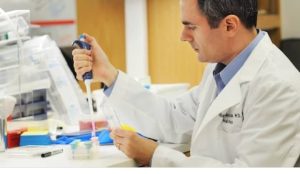Geneticist Salary: Role, Requirements and Career

In the United States, the average geneticist salary is $95,555 per year, or $49.00 per hour. Starting salaries for entry-level employment start at $72,000 per year, with the highest-paid professionals earning up to $142,846 per year.
Genetics is the study of genes, heredity, and genetic diversity in humans. How genes become mutated or are implicated in disease and aging are examples of genetic diversity. Environmental genetics investigates how environmental conditions interact with genes to produce disease or improve a species’ ability to adapt to its surroundings.
A geneticist is a scientist who examines genes, such as how they are passed down through families, mutated, activated, or inactivated. They frequently investigate the role of genes in disease and health. Environmental geneticists examine the interplay between genes and environmental variables that cause disease, aging, and poor health impacts.
Related Post:Big Data Engineer Salary: Requirements and Responsibilities
What Is the Role of a Geneticist?
Geneticists examine how features are passed down through generations. These events could be studied at the molecular, organismal, or population level. Some people are treated for genetic problems. Many environmental geneticists are interested in figuring out how environmental factors or exposures interact with genes to create disease.
Epigenetics – the process by which external environmental variables can switch on or off sections of the genome – is frequently discussed in environmental genetics. While genes are responsible for many features, others are more malleable and may or may not be expressed. For example, if your genetic composition predisposes you to a given condition or trait, you may or may not develop it on your own. Certain environmental conditions, such as nutrition and stress, can, however, trigger that region of your genome to activate and express. For example, genetics may predispose some persons to negative health impacts associated with environmental conditions such as air pollution. Many environmental geneticists are interested in learning more about how these interactions function.
Others research ecological genetics to learn more about how genetics influences species’ adaptability to changing environments. Ecological geneticists employ population genetics to help species conserve, regulate, and improve their genetics. They can, for example, calculate a species’ or community’s reproduction and survival rates. They use their genetic knowledge to detect endangered species and boost genetic variety. Some scientists are working on developing genetically modified plants that can adapt to climate change.
Most geneticists, regardless of speciality, do many of the same activities. They plan or carry out genetic research on gene expression and other areas, for example. They keep lab notebooks in which they document their research technique, processes, and outcomes. They use mathematical and statistical tools to review and interpret lab results. Geneticists must stay current with scientific literature in order to learn about new methodologies, tools, and findings in the field and apply that knowledge to their own study. To fund their research endeavors, they frequently write grants or attend fundraising events. They publish their study findings in academic journals and present their findings at professional conferences.
Related Post:How much do Community College Professors make ?
Duties
A geneticist establishes genotypes and uses diagnostic procedures and tests to detect genetic diseases; uses various laboratory techniques to evaluate conditions; writes reports for clinicians who have requested tests; interprets the results of routine tests performed by genetic technologists; develops and devises new investigation strategies; communicates with clinical colleagues and other health care professionals; trains and teaches colleagues.
What Is a Gene and How Does It Work?
In humans and most living animals, genes are the basic physical and functional unit of heredity. It is thought, humans are thought to possess 20,000 and 25,000 genes. Each person’s body contains two copies of each gene, one inherited from each parent. Most genes, believe it or not, are the same in everyone. In each of us, less than 1% of the total number of genes is unique. Nonetheless, these insignificant changes are sufficient to account for our distinct physical characteristics.
Deoxyribonucleic acid, or DNA, is the building block of genes. DNA is found in nearly every cell in a person’s body, which is why it may be used to identify people in paternity tests and at crime scenes. DNA stores information as a code made up of four chemical bases: adenine (A), guanine (G), cytosine (C), and thymine (T) (T). In the same way that letters of the alphabet are ordered to produce words, the sequence of the bases determines the physical properties of a living thing.
The Genetics Foundation
Gregor Mendel, an Augustinian monk, cultivated plants in the monastery garden in the late 1800s. Mendel was an astute observer, meticulously recording weather, astronomical phenomena, and his beloved pea plants. Mendel used a paintbrush to transfer pollen from one pea plant to another and recorded the findings in order to generate hybrid plants.
Mendel kept comprehensive notebooks for eight years while counting peas and observing plant growth. Gregor Mendel developed the rules of heredity, yet the value of his work was not widely recognized at the time. The terms dominant trait and recessive trait were coined by him. He was the first to apply statistical analysis to hereditary data in order to comprehend and forecast it.
Clinical geneticists today employ Mendel’s concepts, as well as improvements in current science, to diagnose diseases and disorders, assess whether you’re at risk for acquiring diseases, and determine if you’re carrying a gene that may carry a risk for disease in your offspring.
Requirements for Education and Training
A basic research geneticist with a minor in biology and a degree in physical sciences. In addition to conducting research, genetic scientists hold PhD degrees and teach undergraduate and graduate courses. Clinical geneticists often graduate from medical school with a PhD, then complete a three- to five-year residency in a medical speciality, followed by two to three years of specialized study in genetics. Genetic counselors have specialized graduate degrees after completing a two-year master’s program.
Requirements for Knowledge and Skills
Geneticists must be intelligent, analytical, and problem-solving experts. They should be able to assess important outcomes and draw judgments based on quantifiable criteria. Sharing research knowledge necessitates both written and spoken communication abilities. Patience, attention to detail, and determination are all important personal attributes.
Working Environment
The majority of genetic scientists’ time is spent in laboratories or hospitals, planning and conducting research experiments. They also devote a significant amount of effort to keeping up with the newest advancements in their field, writing reports on their experiments, lecturing or teaching about their work, and submitting grant requests to federal or private bodies in order to get money for their study. Geneticists usually operate as part of a research team, sharing ideas and collaborating on various elements of their study. They may work regular hours, however overtime may be required at vital times of an experiment.
Job Prospects
For nearly all civilian vocations, the United States Bureau of Labor Statistics (BLS) keeps track of data and develops estimates. When producing data, the BLS looks at the broad category of physicians and surgeons and does not disclose numbers per practice specialization, including medical genetics.
Physicians and surgeons are predicted to increase at a rate of around 13% through 2026, which is faster than average when compared to all other occupations. Scientific research is moving at a breakneck speed. This means that medical geneticists are better equipped to diagnose, treat, manage, and prevent genetic diseases. Specialists are in high demand, and this tendency is projected to continue.
As a genetics major, what to look for in a college
Explore the websites of departments of interest to learn what research initiatives are currently underway throughout the academic year and during the summer. You’re looking for a school with a strong research culture and a lot of ways to get engaged. Look for seminars or study abroads that have a research component in the course offerings.
Internship opportunities: Look for Genetics programs with ties to local businesses. This will make obtaining higher-profile and more enriching internships much easier (for example, my alma mater, WashU, has an incredible crossover with Monsanto, so there were tons of Monsanto-affiliated labs to work in). Consider which companies and hospitals have labs in the area and how easily they are accessible.
Resources, laboratories, and equipment: Find out how many labs are operating on the campuses you’re interested in, as well as any recent endowments, to get a sense of how robust and modernized the research is. Signing up for department newsletters can give you a fair idea of 1) what technology is being used to aid university discoveries, and 2) how influential this school is in scientific conversation.
Concentration-specific resources: If you’ve decided on a certain area of genetics to study (paleogenetics, Alzheimer’s, or bioinformatics), make sure to look into which schools will best suit your needs. It’s not always the largest or most well-known school that can best help you succeed. Someone interested in agricultural genetics, for example, should look into Texas A&M University, but someone interested in epigenetics should look into Harvard University’s research.
Opportunities in the field: Is there a place at your college where you can study genetics outside of the classroom? Where can I find museums and hospitals in the area? What natural habitats are we talking about? Do the professors go out into the ecosystems? Are there any study abroad programs that you think might be beneficial?
A Geneticist’s skills
Geneticists require a wide range of soft and hard talents, including:
Time management: Because geneticists must meet deadlines when conducting research, they must prioritize tasks and manage their time in order to provide high-quality results.
Problem-solving: Geneticists use experiments and data analysis to find solutions to complex scientific problems.
Perseverance: Geneticists utilize trial-and-error procedures and must be comprehensive in their study, which necessitates perseverance in continuing to work and experimenting with new approaches.
Mathematics: These experts must be able to employ difficult formulae and equations on a daily basis, and they must be familiar with statistics, calculus, and general math.
Many geneticists work in interdisciplinary teams to achieve a similar goal, serving as team leaders and directing and motivating their colleagues.
To derive inferences from the outcomes of their research, geneticists use critical thinking and reasoning.
Geneticists must communicate coherently with their colleagues, publish reports, produce research papers, and give presentations, all of which necessitate verbal and written communication.
Dexterity: When conducting tests and scientific studies, geneticists require precision and accuracy. Dexterity is a critical quality to improve because they may operate equipment that demands precise movements.
Related Post:Kinesiology Major: Admissions Requirements, Universities and Salary
FAQs
To geneticists, what does the notation Rr mean?
To geneticists, the abbreviation RR stands for heterozygous alleles.
To geneticists, what does the notation tt mean?
The abbreviation Tt denotes the heterozygous state, in which the homologous pair contains different alleles of the same gene. The dominant allele for a gene is found on one homologous chromosome, whereas the recessive allele is found on the other.
Alleles are various versions of the same gene. On homologous chromosomes, each individual includes a pair of alleles inherited from each parent. The dominant allele, which is expressed phenotypically in the heterozygous condition, is represented by a capital letter, whereas the recessive trait, which is displayed solely in the homozygous condition, is represented by a small case letter.
Is it common for students to continue on to graduate school?
Yes! It might be difficult to find a career in genetics with just a Bachelor’s degree, so most ambitious geneticists pursue a Master’s or PhD. Medical practitioners require a slew of certifications, residencies, and other credentials in addition to their education.
Furthermore, the genetics major is frequently used as a stepping stone to other graduate programs, such as medical school and veterinary school.









